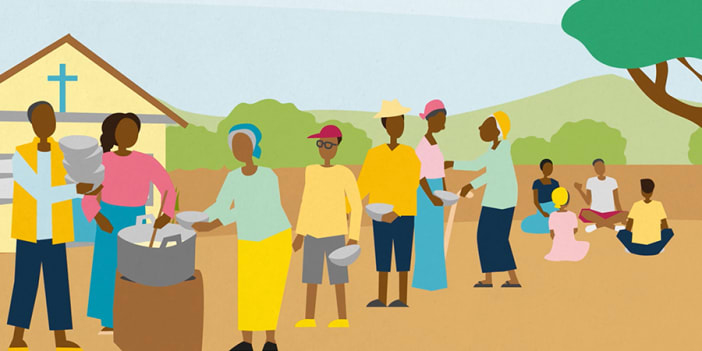by Roshan Mendis.
Sri Lanka is an island with rich and varied vegetation. In the past, most major disasters have been linked to excessive rainfall. In 1999, however, the monsoon failed. People in the south of the island waited hopefully for the next monsoon. But then the next two monsoons also failed to arrive. This meant there had been no rain for 21 months. Wells and rivers became dry.
Paddy rice, which is the main crop and depends heavily on water, was the worst affected. Coconut was another crop that provided an important source of income in the region. Vast areas of trees dried up, losing all their leaves and fruit, leaving only the bare treetops. Many were only fit to be cut for timber, leaving their owners without any income until replanted trees could bear fruit. Farmers were left with huge debts after losing three rice harvests and all their coconuts. Many left their villages to look for work in the cities in order to support their families. Some even resorted to suicide.
The government ignored the crisis, but after two years it finally declared the drought an emergency, though still lacked resources to meet people’s needs. 1.5 million people were affected by the drought, which was the worst in living memory.
Practical help
LEADS (Lanka Evangelical Alliance Development Service), is a Christian relief and development agency based in Colombo. LEADS runs a wide variety of programmes, including community development, housing, drug rehabilitation, peace building and disaster relief work.
Upon hearing about the plight of the villagers in the south, they informed the Christian community in and around Colombo and began raising funds for the LEADS Drought Relief Project. Many private organisations, churches and individuals responded, making generous donations. This enabled LEADS to provide storage tanks and water supply to badly affected villages. Within two days, they had supplied 20 villages with water storage facilities and water. The Buddhist monk of each locality was invited to accompany them in the distribution of the tanks.
LEADS decided to provide water storage facilities rather than bottled water or food rations, so that in the long term the tanks could be used to store rainwater. Their immediate response was to provide water storage tanks of 2,000 and 1,000 litre capacity and drinking water for over 11,000 families in nearly 90 villages.
Next they asked villages to form water committees. These included members of at least 20 families from each village, in order to avoid conflicts in distribution. These committees then worked closely with the rural development officer and with the local authorities. LEADS insists that there has to be full involvement and agreement within the community for any work planned.
LEADS also worked to develop more long-term drought mitigation measures such as providing and improving access to open wells. The wells varied in their use – some were for drinking water and some for agricultural use. Of the 40 wells dug, each one produced fresh water, even in areas where other drilling had failed or had yielded only saline water. Each well supplies at least 30 families with drinking water.
Physical and spiritual impact
The quick response of LEADS staff increased credibility and trust in the organisation. The relief supplied met an urgent need within the community. The churches were able to share the love of Christ in a practical way, at a time when considerable opposition to Christians exists, particularly in the south of Sri Lanka.
Villagers realised that at their time of need it was the Christians who had responded. Many people were touched, both by the practical help given and the loving manner in which it was given. LEADS’ response strengthened the witness and credibility of the local churches as well and opened the doors for more development work in the area.
Advocacy work
LEADS have also worked to persuade some of the banks to be more under-standing in dealing with people who are in debt due to the drought. As a result, farmers have found some relief in paying back their loans and in regaining their dignity. It has also given them hope that the end of the drought may bring a return to profit instead of remaining in debt.
The work still continues, with plans for a water-harvesting project for 500 farmers collecting rainwater run-off. This work should lessen the impact of any future drought. This is being planned in co-operation with the University of Moratuwa and the Department of Irrigation.
Roshan Mendis is the Director for Community Development, Relief and Church Relations of LEADS, Sri Lanka. The address is 25 Hospital Road, Dehiwela, Sri Lanka. E-mail: [email protected]








